#Carrying Marzanna out
Explore tagged Tumblr posts
Text
Morana is Reborn
“You are the lady of life, the mother of the whole world,
You are the pregnant lady, the mother of the sun,
Wherever you set foot, rye is born,
You make the hearts of men and animals beat.”
—Lelek, Marzanna (translated from Polish)
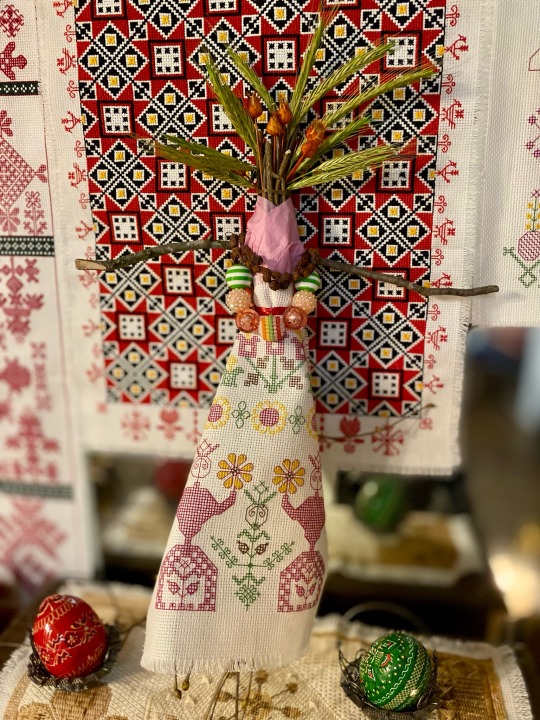
I drown her on St. Matthew’s Day (Feb. 24th), and then set about restructuring the altar into a bower for her to be reborn.
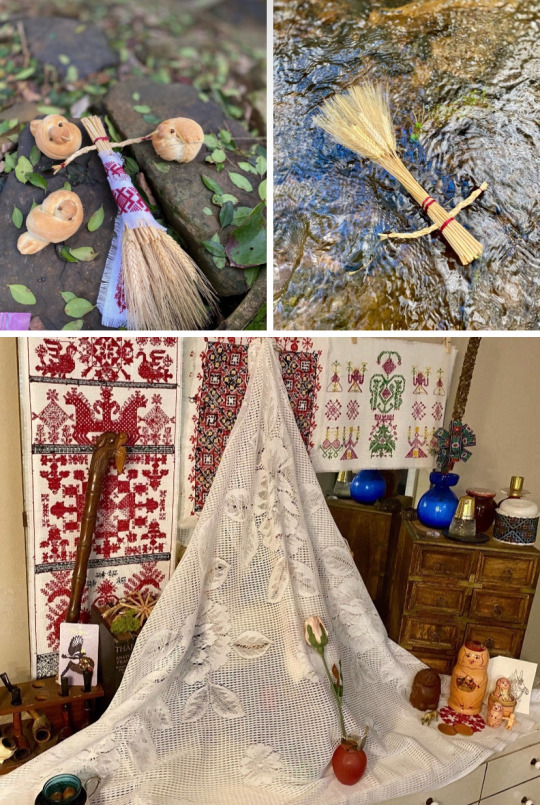
Spring embroideries were hung backwards, and the new Morana (inspired by @zarya-zaryanitsa ‘s beautiful dolly) veiled until Spring arrived. I had decided that this year I was not going to be constrained by the calendar, but rather do things that felt seasonally appropriate for the southern region in which I live—a region where spring comes earlier than the northern lands of my ancestors.
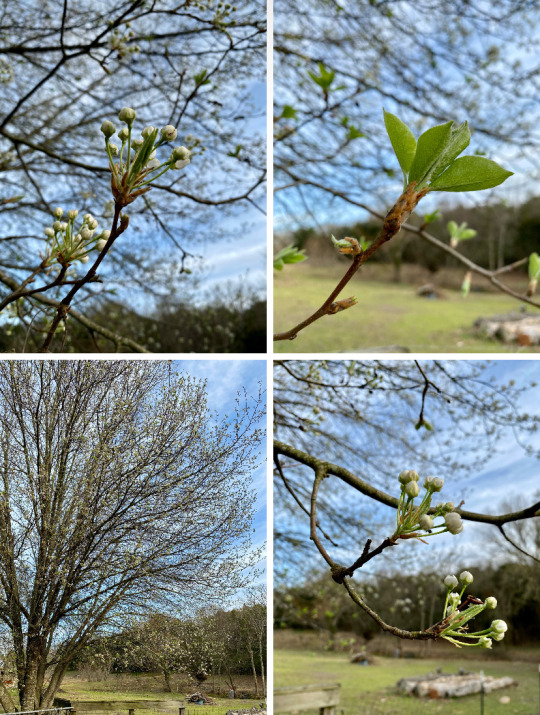
Yesterday on my St. Gregory’s Day mini-pilgrimage around our land I came upon the first new leaves of the year and decided this was the sign that I was waiting for.
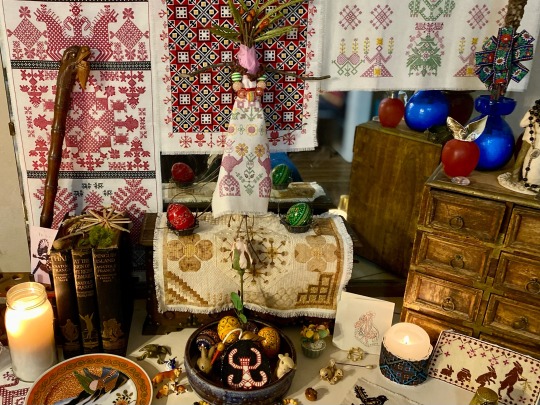
The drowning of Morana (or Marzanna, or Marena, or Mara, or Smrtka . . . ) is an old Slavic tradition and the beginning of my devotional year. Traditionally in the Czech Republic, on the fourth or fifth Sunday of Lent, depending on the region, an effigy of the goddess is thrown into the river to drown; sometimes she is also burned. We know that people have been drowning effigies of the goddess since at least 1420, when it was forbidden by the Catholic church, but probably for much longer. It is a misconception by many that Morana is only a goddess of winter and death.
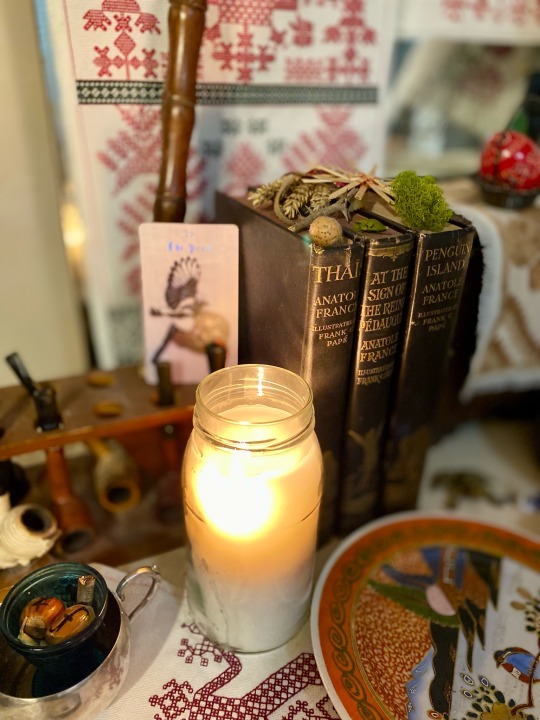
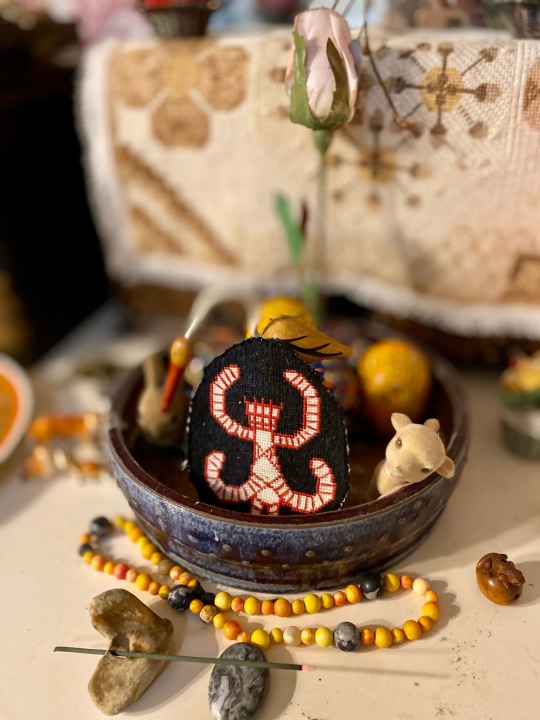
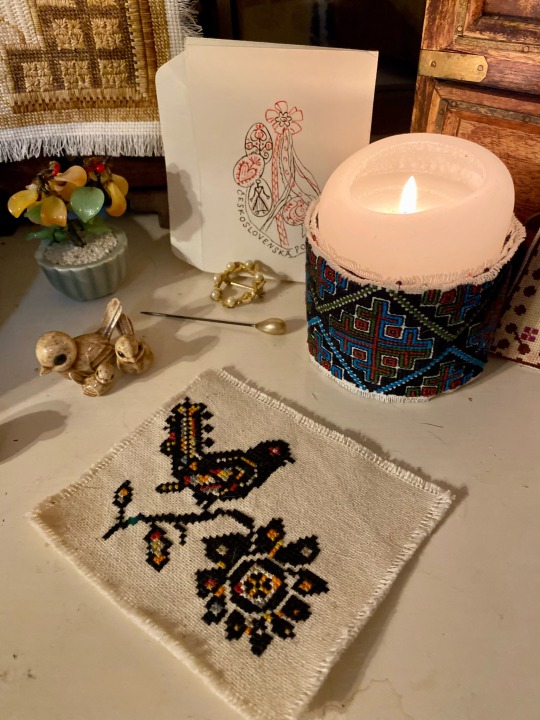
“However, many historical sources and traces of her cult (particularly in the West Slavic beliefs) show clearly that the cold winter is only one of the faces of this goddess. After getting rid of the winter effigy, another similar one was being brought up in a procession around the villages and fields - it was a symbol of spring, the same goddess being reborn after the winter phase and waking up nature’s vital strength for the upcoming growing season. Many of such informations survived in countless folk songs and rituals.” --Lamus Dworski
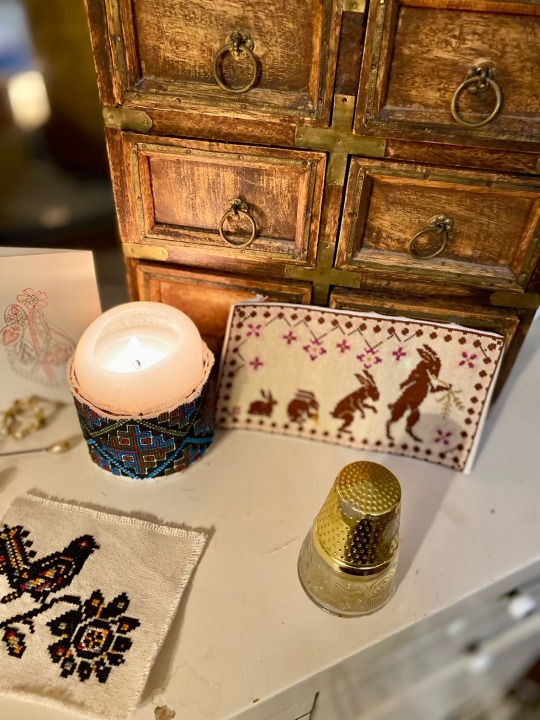
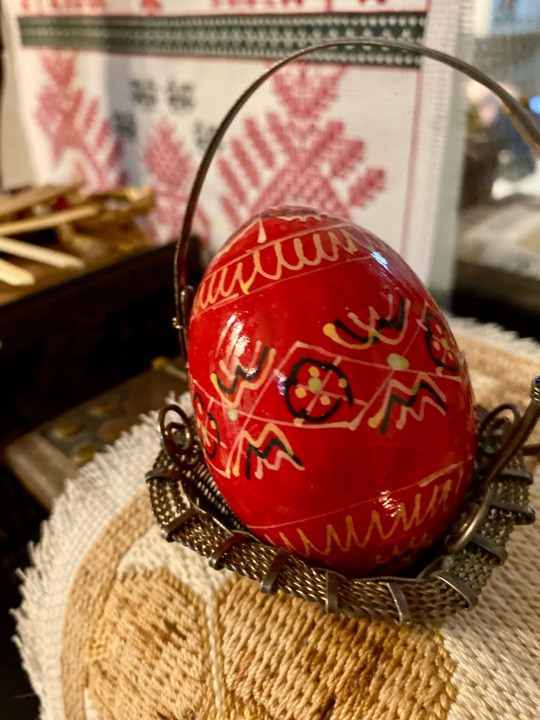
My Spring Morana ritual is two fold. First I drown a dolly that I made the Spring before in the creek that I use as a sacred space for many of my rituals. Then I carry a decked out dolly back up to the house who represents the goddess reborn—and who will be drown the following year.
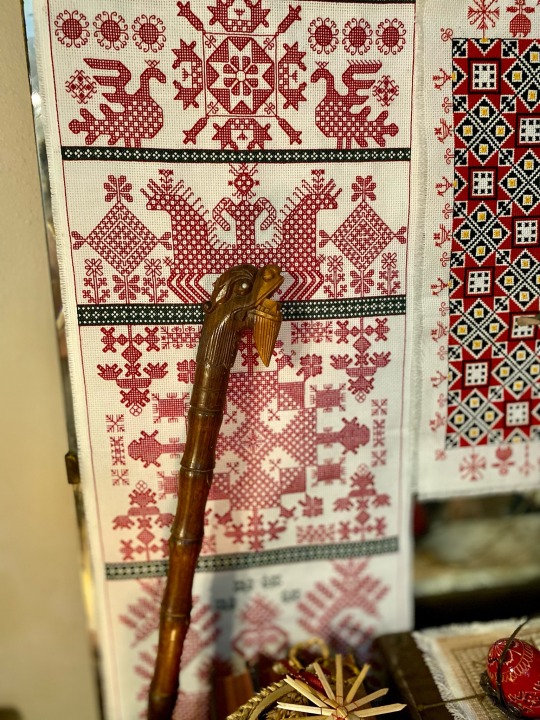
I was excited to place the Sun Goddess Tapestry, completed last summer, upon the altar for the first time for the light half of the year. During the winter season she was hung at Midwinter through Three King’s day to celebrate her rebirth, but then removed until I hung her backwards on St. Matthew’s Day to await the arrival of spring.
@goodfolkbelow @msgraveyarddirt
35 notes
·
View notes
Text
3. tempest

When Marz had heard they were bound for a place called “the tempest,” which lay beneath the seas off the coast of Kholusia, the unnatural stillness of the exposed seafloor likely would have been the very last thing she’d pictured. So much of her life had been spent below the waves, but not like this. Never like this. A part of her wept at the sight of hundreds of sea creatures left exposed and gasping, their ability to breathe sacrificed for that of her companions.
To say that she hated it would be an understatement.
She would have, in fact, made very clear her opinion to everyone assembled, had not there been one other thing she hated even more.
From the corner of her eye she caught sight again of Kaede, herself unnaturally still and pale, the edges of her irises glowing a brilliant, searing white, where they had once been deep blue. She moved with none of her trademark grace, as if she fought her own body for every step. It probably wasn’t far off, if little Halric and his plaster-hard and marble-white skin had been anything to judge by.
For the thousandth time since they’d come to this damned shard, Marz cursed the Ascians, Hydaelyn, and most of all herself – the Ascians for putting them in this position in the first place, Hydaelyn for her damned blessing being less than useless, and herself for being unable to contain even a drop of the Light that Kaede carried within herself, the feeling of it searing through her veins as it slipped through her fingers, leaving only pain in its wake as it flowed on towards its chosen host. For her failure, her best friend was on the verge of becoming a monster, her transformation only paused, not halted. They had reached the point of utter desperation, where even pursuing an Ascian into his lair was preferable to waiting around for the inevitable end.
It was only this that kept Marz’s tongue still when the plan to flood the sea with breathable air was being concocted by the Scions. Far more would die if the Light within Kaede won free and drowned them all in its deluge, but by the Dusk Mother, Marz was so damned tired of necessary sacrifices.
Something of her disgust must have shown in her face, because Thancred seized her elbow and held her in place as the others continued on. He ignored her snarl as she pulled away from him and crossed her arms, meeting her glare with one of his own.
“I know you’re angry. That you want to lash out at everyone and everything that got us here, that got her here. Believe me, so am I. But we need you to keep it together, Marzanna. With Kaede… the way she is… you’re all we have, when it comes down to it. We’ll support you as best we can, but we’re up against a stronger foe than any Ascian we’ve ever faced, Elidibus and Lahabrea included.” His voice twisted on the name of the creature who had worn his skin like a puppet for moons, but he kept on, desperation coloring every word. “You have to be strong enough to do what’s needed. And for that, you have to be in control, not letting your rage flow unchecked.”
Bitter words filled her mouth, the kind she’d spewed at him only days prior, about how he didn’t care, not about her, not about Kaede – all he gave a damn about was ensuring that Minfilia’s death wasn’t in vain, and damn all the rest of them if it came to that. That the noble, high-minded Scions had never seen either Warrior of Light as anything but an attack dog for the good of the realm. She bit them back, swallowed them down, though they churned in her guts. He was right, damn him. And no amount of railing against it would make him anything else.
Not that she would give him the satisfaction of telling him so.
Instead, she lifted her chin in defiance and snapped, “You don’t need to lecture me, Waters. I’ll be a good little Warrior and do my duty, don’t you worry.”
Frustration clouded his expression, and he shoved his hair out of his eyes. “That’s not – gods, you’re infuriating. I’m concerned for you, that’s all. No one can bear Kaede’s burden, but neither can anyone bear yours. If she turns, it falls to you to kill her, you know that, right? You’re the only one who can. And then Ryne…” he trailed off, swallowing hard, clearly unwilling to voice the rest of his thought.
Marz shook her head, violently, and stepped forward into his space, jabbing him in the chest with her finger for emphasis. “That is where you’re wrong. She’s not going to. We’ll find a better way – just like we did with Estinien. If I can rip a dragon’s eyes and soul out of a man I barely tolerate, what do you think I can do for my closest friend? Your plan sucks, Thancred. I’ll kill Emet-Selch, but losing Minfilia to save this fucking shard was bad enough, I’m not about to let it take Kaede and Ryne, too. You can take all your pretty words about sacrifice and duty and what we ”must needs“ do and shove them up your arse. I am not letting this get any worse. And I need you to have my back, no matter what.”
She expected him to bite back, to ask her just exactly how she intended to accomplish all this, but he didn’t. Learned his lesson from their last fight, maybe – both of them were too stubborn and too angry to yield once they’d gotten started, and neither of them had the time for a knock-down, drag-out brawl, with either fists or words. Instead he just sighed and looked away, muscles in his jaw clenching. “Gods, I hope you’re right. Fine. I’ll trust in your ability to pull miracles out of nowhere a little longer. Don’t let me down.” Without waiting for a response, he stomped down the hill towards their party as they were fading from sight.
Left alone, Marz finally forced open the fist she hadn’t been conscious of making until she felt her nails break the skin. “I won’t. I won’t.”
Though whether she was trying to convince him or herself, she couldn’t say.
#ffxivwrite#ffxivwrite 2024#ugh I'm late on this one but I did it#have some shb-era marz-rage#tales from the dusk
4 notes
·
View notes
Text
It does not matter how big or small your canine pokemon are. It doesn't matter how well trained or wild, how weak or powerful.
They still aren't going to understand stairs. The exceptions are Lucario and Zoroark. (Midnight Lycanrocs and Granbulls like to try, though.)
#pokemon headcanons#pokemon behavior#zamazenta my liege and lord i love you dearly#but i cant pick you up and carry you down the stairs.#the same applies to you pele. both of you two are so dumb. i love you dearly but wow you suck at stairs.#luckily i can life raijin aine and marzanna no problem.#Puppy and Lady I can get up and down stairs. The nighters seemed to have figured it out but I assume that's because they're upright.#it was two in the morning and zamazenta couldnt get down the stairs.#i! cant! pick! him! up!#hes so heavy!#Four in the afternoon- so basically an all-nighter so far- and Lady needs help getting down the stairs in Kat's lab.#I'm stumbling over my own shoelaces trying to get down them and Lady is barking at me from the top of the stairs.#I try and turn around to bring her downstairs.#Anyways we had some people over for important things and everyone heard me scream because I fell backwards down the stairs.#my dad will occasionally find loki atop the stairs because she wants down but she cant get down.#usually shes screaming.#I still have my Armatagia. She's six and a half now and she is the exact reason why I had turned half the stairs in my old house into ramps#It was such a painful experience but dammit she was happy about it!#wait wait wait what?! i have no wordworking skills but i think my neighbors do.#sounds helpful and cool! i will be stealing that!#You can absolutely steal it! I encourage the thievery of this particular one!
19 notes
·
View notes
Text
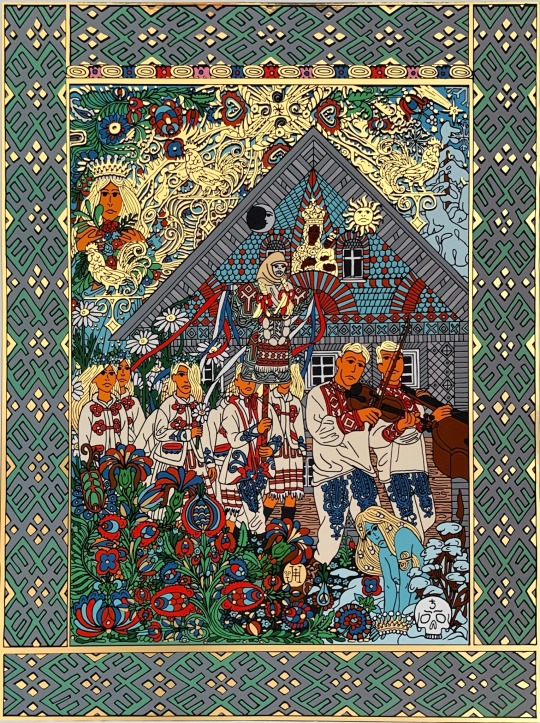
The carrying Marzanna out, a special graphic on gold, which I create for my prepared book Slavs in pictures and poetry about slavic nations (my artwork, print with the colors and the gold foil)
#art nouveau#jan hachran#magical ornamentalism#art#art deco#symbolism#artists on tumblr#artwork#artist#symbols#marzanna#slavic folklore#slavic#folklore#tradition#czechart#slavs in pictures and poetry#art nouveau style#gold#golden#ilustration#drawing#design#art design#decorative#Carrying Marzanna out
105 notes
·
View notes
Note
The closest thing to Easter I can think of would be burning/drowning the effigy of Marzanna. It symbolises winter leaving and welcoming spring ie. rebirth of nature. There isn't really a direct link to any stereotypical Easter traditions I don't think (I never heard of bonfires being a thing for Easter, it's definitely something I'll look into as there might be a link between the traditions there).
I did a bit of research on easter eggs a few years back (I say research, it was just intensive googling) hoping to find something about holidays predating Easter (in slavic countries). Sadly, haven't had much luck. Every site says they originate from pagan practices with no additional info.
I tried collecting as many rebirth/spring equinox slavic celebrations/traditions in hopes I could somehow connect them. Sadly, not much luck here either. It's like every other tradition somewhat correlates apart from spring traditions.
I do wonder if the burning of Marzanna and the burning of Pust are related. They aren't celebrated at such close dates, but the tradition and symbolism is very similar, though I suppose the dates today are probably a bit different than how they used to be - especially since I believe neither of these had a fixed date in the past. But I still don't know how easter eggs fit into this (and slavic easter egg traditions feel far to elaborate to be a variation of something imported from another culture, so I definitely agree with those articles about it being a pre-christian thing).
Some sources list Vesna (at least in Croatia) as a spring counterpart to the winter Morana/Marzanna. My guess would be that easter egg and related traditions were performed after the burning of Marzanna as a celebration of the coming spring. (But then here it also gets confusing because the celebration of st. George is also said to celebrate the coming of a spring god, expect here it's not Vesna, which I would say is just different slavic cultures having variations of gods, but st. George celebrations are also of big importance in Croatia - but I'll stop now or I'll be writting about this all day).
Tl;dr I don't know any specific holiday that correlates to Easter in this areas, but there might be some related traditions
And about Easter practices in the place where I live: just colouring Easter eggs, eating traditional food and going to church
Sorry for going on a bit of a tangent (especially if this is stuff you already know). Prechristian slavic traditions are just something I'm really interested in. It's a shame we don't know more about them.
Hey that's some really interesting lore, thank you so much! I was also researching easter eggs today by the method of googling obsessively, but I find different info on every source; croatian wikipedia says they came from iranian spring holiday, Norvuz, I check on the english wiki, and it says the oldest colored eggs were found in Africa, and additionally that it was started as a nobility thing, they were seen as a luxury for nobles to gift to each others at parties.
So I feel like maybe colored eggs were around in multiple cultures and christianity just decided to appropriate all of it for their own causes?
I love both Vesna and Morana as slavic goddesses and I'm so excited to hear someone else speak of them! I'm also very interested in prechirstian slavic traditions and would love to revive them, even in small measures. We had more traditions, like Flower day, when we started the day washing our faces in water filled with flowers, mostly violets, and we'd say good wishes during the washing! Christians also tried to spin it as a 'jesus torture related tradition' and I haven't seen it done in recent years at all.
We also carried a little olive branch to the church to get it blessed to bless our homes with it, and it was used as a protection against storm and bad weather. I wonder what the origin of that was!
If you find out more please let me know! Traditional celebrations make so much more sense to me and I feel that building new culture on that foundation would be very valuable for a meaningful life.
18 notes
·
View notes
Text

As Sokolov twins bear the name of HAWKS/FALCONS, in Gen.pac.t they represent the “heavenly birds” when they are younger - Sirin and Alkonost. Yes, the heavenly birds in Slavic Mythology showcase themselves as having female faces and female voices, but there’s meaning behind them that makes it more obvious why the Sokolov twins are compared to those when they are young.
Alkonost is considered a true heavenly bird that sings of happiness and always laughs. Victor showcases himself as a man who has a more positive yet realistic outlook while opening his heart and his arms to those who he considers allies and friends. He’s someone who made people love and adore him as a true leader, he’s someone who’s welcoming from the bottom of his heart despite his similar bastard nature as Zarina. This man also has duality, but he’s more honest with his intentions.
As Victor grows up, he transforms from Alkonost to Zhar-Ptitsya or Firebird. He doesn’t lose his bird image, meaning he retains his true self and he remains the same person who he was before without breaking - he is someone who is more flexible, but he is not alone and he knows he needs to move forward. The Firebird in the Slavic mythology is considered a blessing but also a curse, specifically a curse to those who captured it. The Firebird is close to Phoenix in terms of being a bird associated with fire and Sun. It is important that Victor remains a bird, because it shows that he is not losing his humanity and he is not losing himself even after the loss in rebellion and after having so many injuries after escaping the prison in Snezhnaya. One of the reasons why Victor was able to retain his image as a ‘bird’ (himself) is also because of Margarita, the woman who saved him after his escape and who he fell in love with, showcasing that he will protect her. The fact that Victor had someone by his side helped him remain the true self without losing the meaning behind his surname “Falcon/Hawk” and transform into a stronger bird there is in stories.
It’s not the same for Zarina as she is one who represents Sirin when she’s younger. Sirin is the heavenly bird that sings about destructions and is similar to sirens from the European mythology. Sirin is the melancholic, sad, crying bird that doesn’t smile and doesn’t showcase warmth as Alkonost does. This is parallel of how lonely and isolated Zarina is in Genshin emotionally just like in her main verse - she’s unable to build meaningful relationships easily, which brings her to be more in seclusion and be more protective of those who already know her as she is. However, unlike Victor, the grief and shattering Zarina went through at the cost of Aleksey’s life turned her away from the ‘bird’ symbolism that she was supposed to carry with Victor. Instead, Sokolova turns into the concept of winter and death. Instead of stalling in the state of Sirin, a bird, still retaining her pre-Rebellion personality and longing for family and for happiness, she turns her back on everything she could’ve had.
Zarina transforms into Marzanna/Morana, the goddess of frost, winter, death and the cycle of rebirth in Slavic mythology who is known to be the bringer of death and is known to be killed in Spring to invite it out. This symbolized the fact that she herself has cut away her wishes and desires of remaining alive at the end of her plans, this cuts away her salvation and her views on the better possible future - she is no longer grieving in the open, she is no longer showing her true emotions, she is no longer considering sparing anyone because winter and death are apathetic. Zarina doesn’t have anyone who can support her and remind her to be the way she was, the way she’s been, and to look forward into the future - she is all alone and she built an underground empire once more. Unlike Victor, she decides to toss away the feels, the emotions, the happiness, the future - all because there is only one goal for her in her mind as she’s shattered beyond repair and she doesn’t want anyone to save her. Plus, the beginning of spring is when winter dies - the ritual of inviting/welcoming spring back is followed by the drowning of Marzanna/Morana’s doll - it is a symbol of the fact that if you wish to see the spring again after meeting her, you have to kill who she is. This is a straight way of saying that there is more possibility of stopping her by killing her instead of trying to reach her, because you’ll have to go through blizzards and apathy that have settled in her heart to actually reach whatever there is left... if there is anything left. Mayhaps, you can find the weeping Sirin once more.
#❄ ― HEADCANONS. ╱ the cold,pure flame of conquering is what I was destined for.#hi i love slavic mythology and i love using symbolism#❅ 𝐕. GENSHIN IMPACT ⤻ defeated by the enemy you’re still standing,you’ll bury them and tear them apart. ❞
10 notes
·
View notes
Text
Hello and welcome to Folk Magic Friday!
Last week I asked you what should I write about next. You choose Marzanna, the goddess of death and also the celebration of begginning of spring 🌺
Marzanna (in other countries called Morana, Morena, Mara or Marana) is a goddess of death, but also of rebirth. She is a fiancee of Jaryło, which is a god of fertility and harvest. They are the opposites of each other. When one is dying, the other one is born. After their marriage Marzanna finnally dies one more time and does not reborn again, but Jaryło does, as a solar god 🌿
Marzanna was imagined as a lady on an empty, green meadow, with geese. Around the meadow there is floating, dark water. It was believed that in the afterlife your soul would change into a bird-type shape, like a goose, and you will be on a green meadow. It is beacuse of birds movement as a seasons change – lots of birds leave our country for winter and come back for spring – like for example stork, which is known as a sign of spring.
Water around the Marzanna’s meadow is a symbol, border between the living and the dead. Water is also connected to chaos and death, but also new beggining, ressurection and rebirth. This meadown on island is a perfect place for dead souls that can become birds or, in other books, cattle. Death and rebirth. Dead soul became a goose or a cow 🌿
Marzanna is also a doll or a effigy made of straw wrapped in cloth. People add some ribbons to it, some blown eggs, flowers, fresh or made of paper or blotting paper. In my distric Marzanna’s effigy looks like an old lady, but there are also versions of young Marzanna with flower wreath. In some places (like for example Silesia) there is also a male version of Marzanna, Marzaniok. Important part of Marzanna are golden keys to paradise, which are sometimes added to whole effigy 🌿
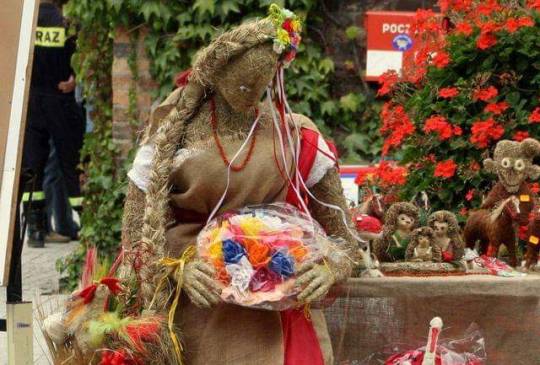
People usually walk with Marzanna at the edge of a village or town and drown the effigy in the river or any water nearby. It is also a symbol of Marzanna going back to the nether, into the Great Ocean. Drowning the effigy was also a ritual for making spring come earlier and to ensure good harvest in upcoming year. In some districts Marzanna is burned first, then drowned. In some districts there is also a tradition – after drowning an effigy people raced back to the village. Last person should expect death in upcoming year.
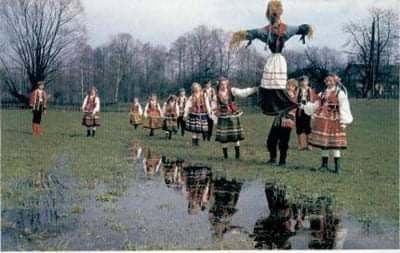
Catholic church tried to forbid this tradition, first attempt about it in written documents is from 1336 year, but people do this still today. Fun fact: the church tried to change this tradition into something, of course, more Catholic, so they proposed new tradition – throwing an effigy of Judas from the church tower. Somehow it didn’t work 🌿
With Marzanna goes second tradition, which is gaik. People carry boquets of greens, twigs and branches, sometimes also with ribbons and blown eggs, as a symbol of rebirth. It was a tree of rebirth, carried from house to house for good luck and prosperity. Sometimes it’s attached to Marzanna’s effigy. In some regions people first drown Marzanna out of town, then come back with gaik as a symbol of spring 🌿
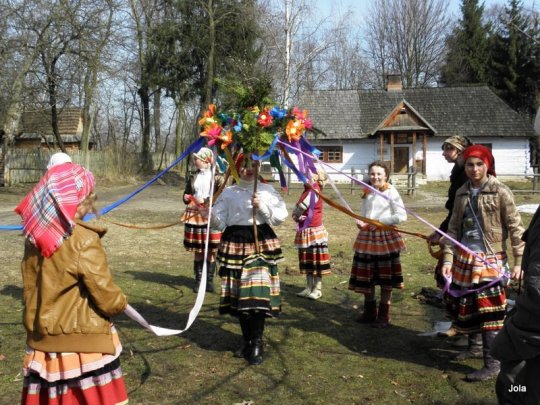
That will be all for now. Let me know what do you think about this tradition?
And of course: what’s next? Should we check some mythical creatures or would you like to know more gods from slavic pantheon?
And as previous, I wanna share with you some music by Żywiołak. Music video is beautiful and definetely describes this tradition (some effects may trigger seizures, it's short, but I want to warn you)
Iga
24 notes
·
View notes
Text
Slavic Gods Associated with the Underworld
Veles
“Slavic people believed that this god is often shown in a form of a bear, even though Veles is capable of transforming into other animals too. But, in later writings, this god is presented as a demon, where he lost his old functions and then linked to the devil and the underworld. Fact is that mythology among early Slavs also developed as their own turbulent lives, so naturally even the gods changed during ages in the eyes of the common folk. When their crops would die out due severe droughts they created a myth how Veles stole the heavenly cows and rains stopped. Even thought Veles with no doubt was considered a “mischievous” God, he was still a subject to worship and respect. It was him that protected farmers cows from plague or improved their crops and land fertility. Average people didn’t want to interfere in mythological fights between Veles and Perun, but in fact worshiped them both as major forces of this world, often according to their own needs.”
“Veles (or Volos) is sometimes called the second most important god of Slavic religion. The old Ruthenian chronicle which calls him skotiy bog makes him the god of cattle. This would also position him as the god of wealth (as cattle was one of the main markers of a family’s wealth). Other hints suggest he could have been linked to such domains as magic, poetry, oaths, the underworld, and the dead.
Veles is sometimes seen as the mythical antagonist of Perun, part of a structural pattern that may reflect a more ancient Indo-European myth of a primordial rivalry between the two opposing supreme deities (compare: Mitra and Varuna in Hindu mythology). Historians and ethnographers suspect that the relics of this ancient notion may have survived even centuries after Christianisation, and can be found in the Slavic Cosmogonic myth which transposes the same theme of rivalry between God and the Devil (See below: Slavic Creation Myth), the latter being a version of Veles. This identification can be observed in Czech folklore as late as the 16th century, where the phrase ‘Jdi za moře k Velesu’ (Go across the sea to Veles!) means ‘Go to the devil!’.”
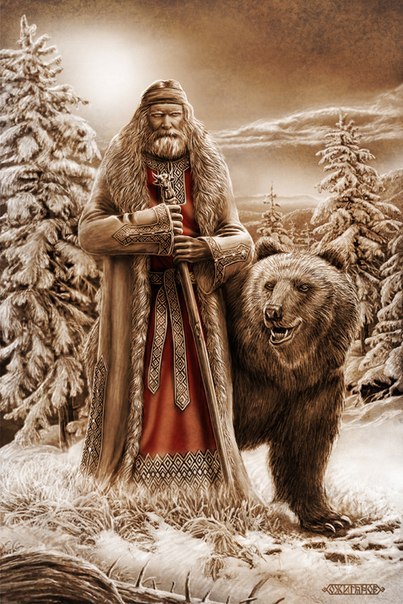
Chernobog
“Also spelled as Czernobog, Tchernobog is a Slavic deity, whose name means black god, about whom much has been speculated but little can be said definitively. The only historical sources, which are Christian ones, interpret him as a dark, accursed god, but it is questionable how important (or evil) he was really considered to be by ancient Slavs.
About Chernobog, there was just one written document named Chronica Slavorum from Saxon missionary Helmold that says:
''Among Slavic people, there is one weird belief that is kept in their drinking fests and feasts. They at same time bless and curse under names of their Gods, respectively in the name of good One and evil One, saying that good things come from good God and evil comes from evil One. In their language they call evil God ''Chernobog'', or ''black God''.''


Morana
“Morana is a pagan Slavic goddess associated with seasonal rites based on the idea of death and rebirth of nature. She is an ancient goddess associated with winter's death and rebirth and dreams. In ancient Slavic rites, the death of the Goddess Marzanna at the end of winter becomes the rebirth of Spring of the Goddess Vesna representing the coming of Spring.”
“In modern times the rituals associated with Marzanna have lost their sacred character and are a pastime – an occasion to have fun and celebrate the beginning of spring. The tradition is usually celebrated around the spring equinox (March 21). Usually schoolchildren and young people participate in the celebrations alongside local folklore groups and other residents. A procession consisting of men, women and children carries handmade Marzanna to the nearest river, lake or pond. The participants sing traditional songs and throw effigies of Marzanna into the water. Sometimes the effigies are first set on fire, or their clothes are torn. On the journey back to the village the focus falls on the copses, adorned with ribbons and blown egg shells. The procession, still singing, returns to the village."
“Researchers emphasise that Marzanna functioned not merely as a symbol of winter, but also as a Slavic goddess. Marzanna's later association with death (in some regions Marzanna is called Death Crone) trivialized the importance of the goddess, who was the lady of not only death, but also life, and commanded the natural world.”
“Drowning Marzanna in water (an element of high importance in season-related folk celebrations) is understood as the goddess' symbolic descent into the underworld, to be reborn with next winter. Some researchers underline the sacrificial character of this ritual and suggest that Marzanna is sacrificed in order to appease Winter. The authors of Wyrzeczysko propose that Marzanna is sacrificed to the demons of water, whose favour was necessary to ensure a plentiful harvest in the coming year.”

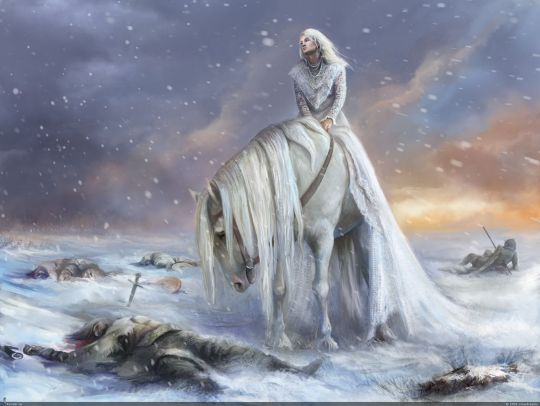

Karna
“Goddess of the funerals, personifying tears. She is compared to the Indic Karna.”
“Yet another goddess of death, the ancient Karna is depicted as a young woman with black hair and bright red clothes. She is said to be the daughter of the goddess Lada. She spends most of her life down in the underworld. Some sources claim her to be related to Marzana (the goddess of winter and death, it might be a region differential)”
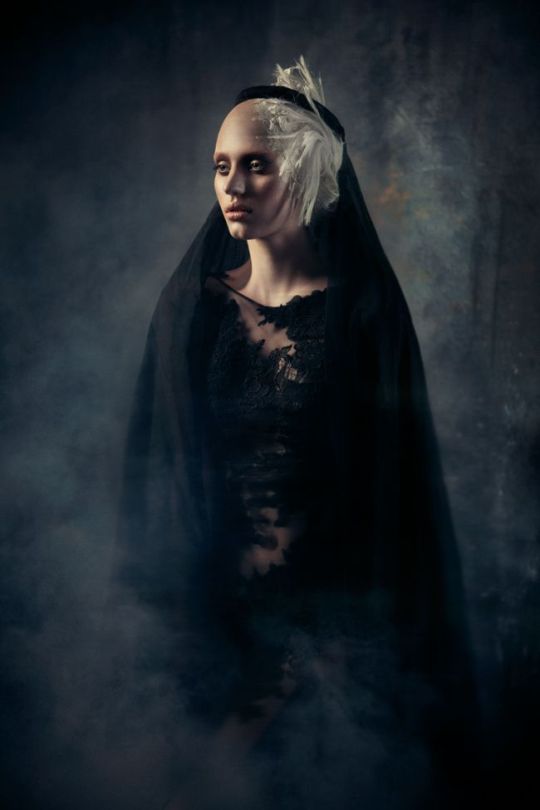
Oźwiena
“Goddess of the echo, and generally of voice and oral communication.”
“She was a companion of the god Veles, the goddess of echo. Some specialists in mythology connect her with Greek nymph Echo. She was also the goddess of gossip. According to the legend, it was impossible to her keep something she heard as a secret. Whatever you told her, she shared it. However, if she liked someone, she spoke only good things, but when someone became her enemy, she spoke all the bad things about this person. Moreover, Oźwiena loved glory, fame and listening to the stories.”

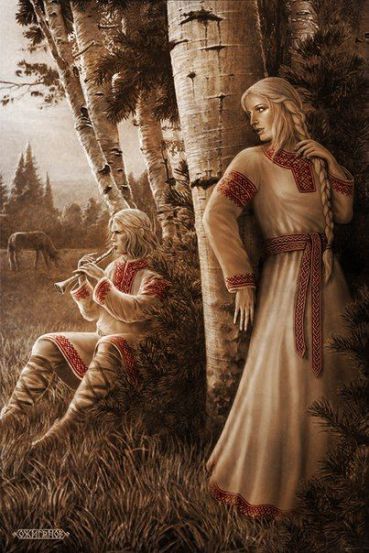
Flins /Hela
“Hela, the death goddess, is represented with a lion head with an outstretched tongue. As Myda, an aspect or another name of hers, she is represented as a crouching dog.”
“God of death who may be a Wendish name of Veles, although the iconography is rather different. He is sometimes represented as a skeleton with a lion upon his shoulder, holding a burning torch in his hand, and placing a foot on a large pebble. In other cases he is represented as an old man, with the same attributes of the skeleton, except for a flint instead of a pebble. His cult was widespread in Lower Silesia, Lusatia and Saxony.”

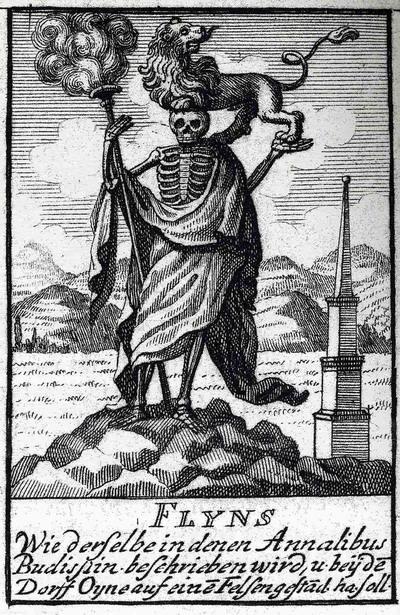

Morok
“Morok, literally “Darkness” in Russian, is a concept that has been deified in modern Slavic Native Faith (Rodnovery). He is the god of lie and a deceit, ignorance and errors. At the same time, he is a keeper of ways to the truth, hiding such ways to those who pursue truth for vanity and selfishness. He has a twin brother, Moroz (“Frost”), and they switch into one another at will.”

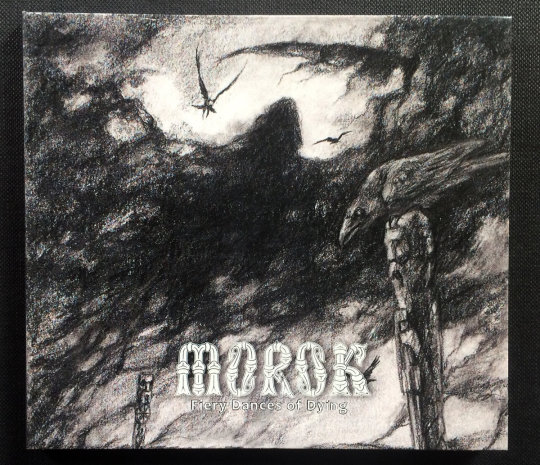
Nemiza
“God who cuts the thread of life, sometimes represented as a male with four beams around his head, one wing, and on his chest a dove with outstretched wings, and sometimes represented as a naked female with an eagle by her side gazing up to her. Nemiza was regarded both as a calamity for bringing death, and as a beneficial figure for introducing the soul to a new life.”

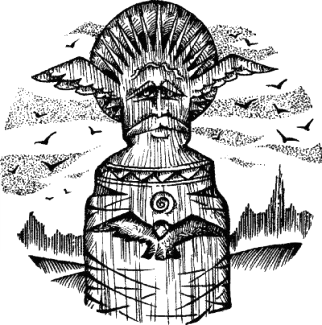

Ny
“Ny is the god of the underworld who acts as psychopomp, that is to say the guide of the souls into the underworld. He is associated with subterranean fire and water, snakes and earthquakes. Peklabog or Pekelnybog is another name of the god of the underworld, and he has been compared to the Indic Shiva. Etymologically, the word peklo means "pitch", and after Christianisation, its meaning became that of "hell", often personified as the Devil, and pekelnik any being of hell.”
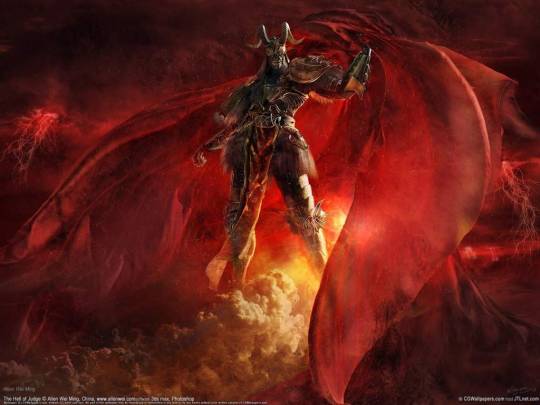
https://www.slavorum.org/veles-the-slavic-shapeshifting-god-of-land-water-and-underground/
https://mythology.wikia.org/wiki/Chernobog
https://en.wikipedia.org/wiki/Morana_(goddess)
https://en.wikipedia.org/wiki/Deities_of_Slavic_religion
https://aminoapps.com/c/pagans-witches/page/blog/dark-slavic-gods-goddesses/xpdX_JM6s2uVLKp7bdXgQmXmqBXQQrvBvG
https://culture.pl/en/article/what-is-known-about-slavic-mythology
22 notes
·
View notes
Text
headcanon masterpost: cintra.
because i strongly believe that cintra is both meant to symbolise and based on poland (a politically strong country that had a strategically important position on the map, with access to the sea, that is conquered, ruined and oppressedby a big and cruel invader) i’ve decided to list a couple of polish traditions in context of cintra. i will be a also using poland’s culture in my further worldbuilding of the country.
spring:
in cintra, spring is a very joyous time of the year. the official first day of spring is on the 20th of march. on that day, girls make flower crowns and walk around in them until sunset, when they then set them down yaruga river. legend says, that if their flower crown makes it all the way to the sea without sinking or being caught on the shore or in the debris, the girl would get happily married that same year. flower crowns have very significant meaning in cintra, specifically among the common folk. a young girl wearing a flower crown announces that she’s a maiden and seeking marriage. a man taking the flower crown off her head and throwing it into the river can be an equivalent to a proposal. on the first day of spring day, a big celebration is held in the main market of each city, where people can dance and sing songs about saying goodbye to winter and welcoming summer. on top of that, a doll of straw that symbolises winter is being made (marzanna) that is either being burned, or drowned, to ensure that winter leaves for good and the weather starts getting better for the crops. accidentally, 20th of March is also queen calanthe’s birthday.
summer:
the day of summer solstice, the 20th of june, is also known as the night of kupala. it’s the shortest night of the year. it’s the night when the sun, the moon, fire and water, fertility and plentiful harvest are celebrated. nobody sleeps on that night. a huge feast is held in the main market of the capital, where everyone, rich and poor, can come and sit at the table. massive pyres are burning, and people dance around them, holding hands.
autumn:
the night on the 31st of october - 1st of november, is when cintra celebrates DZIADY (in loose translation - grandfathers). the night when the dead and the living celebrate together. it is believed, that on this day the souls of the deceased relatives come back home, to warm themselves by the fire and search for the commemoration meal prepared for them. candles are lit on the graves, as the light is supposed to remind those that left this world, that they are loved and remembered. sometimes, loafs of bread would be given out to those in need, or simply left on the grave together with the candles. it is a very quiet holiday, with not much music or laughter, most people lost in their own thoughts and memories, contemplating the fragility of life. on top of that, 30th of november is believed to be the day the line between the mortal world and the world of the spirits is the thinniest - it’s a good day to communicate with the gods, the loved ones that has passed on, and any prophecies, divinations and spells are believed to be stronger on that day.
winter:
the winter solstice festival is filled with revelry. processions of people masked like animals and dressed in costumes roam the villages. often such processions consisted of a person disguised as a half-human, half-goat, a child riding a horse and a man holding a solar symbol lit by a candle, meaning to symbolise the sun that would soon come. this group of revelers would go from house to house and stop to sing songs. these songs usually included invocations to the gods, praises and good wishes to those who listened, requests for gifts and threats if refused. the pranks played against those who would not give rewards could be brutal. bonfires were sometimes lit, and the dead ancestors were invited inside to warm themselves. mock funerals were held where a person pretending to be dead was carried into the house amidst both laughter and feigned weeping. a young girl would be chosen and traditionally would kiss the “corpse” on the lips. the “corpse” would leap up after being kissed - a symbol of rebirth. later, in queen calanthe’s reign, that would also be time when bread, hot water and warm clothing was given out to those in need, whose harvest wasn’t good enough to survive the winter on their own.
6 notes
·
View notes
Text
Best Upcoming Non-Western and POC Fantasy Books in 2020
https://ift.tt/3jP41EA
The world of fantasy is expanding (as you can see from the awesome, expansive titles we covered in 2019). While I still love a good tale of a farm boy from a feudal nation saving the kingdom (or the world), I’m thrilled that so many great titles from beyond the traditional fantasy white European setting (so, you know, a majority of the world) are hitting American bookshelves.
This list of most-anticipated non-western fantasies has some ongoing series titles, as well as conclusions to fantasy sagas, and brand new series starters. So whether you’ve been following titles inspired by world locations beyond western Europe, or whether you are brand new to this window into where the fantasy genre can go and has gone, we’ve got you covered. Here are some of the titles I’m most looking forward to this year.
Most Anticipated Non-Western Fantasy Books in January
Woven in Moonlight by Isabel Ibañez
The Illustrians have been usurped, and Ximena, a stand-in for the last remaining Illustrian royal, is ready to seek revenge. When the usurper, Atoc, demands the hand of the Condesa in marriage, Ximena goes instead, seeking a chance to destroy the relic that brought Atoc to power. Ibañez drew inspiration on stories of revolution in Bolivia, where both of her parents are from, in creating this South American influenced fantasy world.
Read Woven in Moonlight by Isabel Ibanez on Amazon.
Scavenge the Stars by Tara Sim
This YA fantasy spin on The Count of Monte Cristo begins when Amaya rescues a mysterious stranger from drowning. Sure, she’ll face greater punishment aboard the debtor’s ship that has been her home for years, she instead finds herself rewarded. The only reward she wants? Revenge on those who have wronged her. But of course, revenge comes with its own costs, and as she becomes embroiled with the son of the man she wants to destroy, she uncovers truths that convince her to trust no one. The first in this duology comes from the author of the Timekeeper trilogy, and would pair well (for adult readers) with 2019’s excellent Queen of the Conquered, which has its own echoes of The Count of Monte Cristo.
Read Scavenge the Stars by Tara Sim on Amazon.
Riot Baby by Tochi Onyebuchi
In this contemporary dystopian fantasy, Ella can see the future of others. Her powers alienate her from her family, including her younger brother Kevin, who was born on the day that the police officers who beat Rodney King were exonerated in court. Alternating between Ella and Kev’s perspectives, the story follows the siblings from Kev’s promising childhood into his incarceration—for being a young black man in America. When Ella, who vanished years before, begins to visit Kev through astral projection, she leads him through the memories of others that she has experienced, guiding him to possibilities for a different future. Onyebuchi’s #OwnVoices story shines light on the realities of the structural racism and brutality faced by contemporary black Americans.
Read Riot Baby by Tochi Onyebuchi on Amazon.
Most Anticipated Non-Western Fantasy Books in February
Deathless Divide by Justina Ireland
Jane McKeen started putting down the restless dead in Dread Nation, and she’s back in the divided America of the 1880s. Summerland has fallen, but that doesn’t make Jane’s life any easier. Enemies are still around her, and she finds herself questioning if she really understands the world. It’s a good thing she’s got Katherine Deveraux watching her back. Kate never expected to be Jane’s ally, but she knows just exactly how important it is to have friends in a world as dangerous as this one. This sequel to Ireland’s celebrated first novel comes after Ireland penned a few Star Wars novels, and it’s great to see her back in the Weird West from a galaxy far far away.
Read Deathless Divide by Justina Ireland on Amazon.
The Seventh Sun by Lani Forbes
This Maya-and-Aztec-inspired series starter reveals that the sun is fading, despite all of Prince Ahkin’s efforts to the contrary. When he must select a bride from among six candidates—and sacrifice the other five—in order to ascend to the throne, he feels connected to Mayana. But the gods may be against them, and the world may be on the brink of a darker apocalypse.
Read The Seventh Sun by Lani Forbes on Amazon.
The Wolf of Oren-Yaro by K. S. Villoso
A war tore Queen Talyien’s nation apart. A marriage was supposed to save it. But when her groom disappears, there’s no way to unite the rival clans of her nation, fracturing the kingdom. When, years later, he sends her a message requesting that they meet, she holds out hope that there will be peace—until someone tries to kill her. In order to save her people, and herself, she must become the Bitch Queen, the she-wolf, that her enemies have called her. Villoso grew up in the Phillipines and draws inspiration from that setting. This novel was originally self-published in 2018, but the traditionally printed books launched this year for an expected trilogy.
Read The Wolf of Oren-Yaro by K.S. Villoso on Amazon.
Most Anticipated Non-Western Fantasy Books in March
Thorn by Intisar Khanani
I loved the self-published version of Thorn when it was first released in 2012, and I’m excited to see a fully revised, expanded version coming out this year from HarperTeen. Drawing inspiration from the story of the Goose Girl, the story revolves around Princess Alyrra, whose identity is stolen from her by a sorcerer, robbing her of her royalty—but also granting her a chance to start fresh, free from the expectations of her family. However, when she uncovers a plot that threatens the prince she was to marry, she must decide whether to remain silent, or return to the royal world she longed to escape. This new edition of the #OwnVoices novel also includes Khanani’s fantastic short story, “The Bone Knife.”
Read Thorn by Intisar Khanani on Amazon.
Night of the Dragon by Julie Kagawa
The eagerly awaited conclusion of Kagawa’s trilogy is almost here! This third book in the “Shadow of the Fox” series follows the cliffhanger ending of Soul of the Sword. Hopefully this installment will reveal what has happened to Kitsune shapeshifter Yumeko and her love-interest-slash-enemy, Kage Tatsumi, who was possessed by a demon.
Night of the Dragon by Julie Kagawa on Amazon.
Wicked as You Wish by Rin Chupeco
Tala doesn’t really care about magic—and she sometimes negates it accidentally. Her family is part Filipino—she descends from Maria Makiling, a Filipina heroine—and part tied to the old, disappeared country of Avalon. When the Snow Queen returns from the dead, and an Avaolian firebird shows up on Tala’s doorstep, she’s thrust into a dangerous world of spelltech in the Royal States of America…
Wicked as You Wish by Rin Chupeco on Amazon.
A Wish in the Dark by Christina Soontornvat
Although this Thai-inspired fantasy novel is geared toward middle graders, there’s no shortage of depth to the story. When prison-born Pong escapes, he discovers that the world he’d longed to see is just as unfair and impoverished as the one he left behind. The rich thrive in the supernatural lights of Chattana, but the poor remain struggling in the shadows. Nok, the prison warden’s daughter, is determined to bring Pong back inside before her family is at the center of a scandal. But her own experiences outside the prison make her question the truths she has long trusted. With inspiration drawn from Les Miserables, this middle grade fantasy also has plenty of adult appeal.
Buy A Wish in the Dark on Amazon.
Most Anticipated Non-Western Fantasy Books in April
Incendiary by Zoraida Córdova
Renata is a memory thief, once in service of the king of Andalucia—though not of her own volition. She was kidnapped as a child and forced to carry out the King’s Wrath, leading to the deaths of thousands of her own people. Now, she has joined the rebellion, but even among the people who rescued her from the king, she is mistrusted. When she’s tasked with rescuing her commander—and love interest—from the palace, her rage and desire for revenge are tested. What will it cost her to keep her cover? Córdova is best known for the “Brookyn Brujas” series, and this Spain-set historical fantasy series starter is likely to feature some of the same appealing magic that made the contemporary fantasy series so popular.
Read Incendiary by Zoraida Cordova on Amazon.
The Ranger of Marzanna by Jon Skovron
This Russian-inspired epic fantasy features two siblings destined to oppose each other over the fate of the invading Empire. Sonya is training to be a ranger. Sebastian, her brother, is the world’s most powerful sorcerer. When their father is murdered by imperial soldiers, Sonya decides to take a stand against them, gathering together allies to push the invaders back. But Sebastian sides instead with the Empire, leading them to a final confrontation that will determine the fate of the world—and their family.
Buy The Ranger of Marzanna on Amazon.
The Red-Stained Wings by Elizabeth Bear
Set in the same world as Hugo-winner Bear’s epic “Eternal Sky” trilogy, The Red-Stained Wings continues the story of “The Lotus Kingdoms” she began in her 2017 novel The Stone in the Skull. Both books follow The Gage, a wizard-created brass automaton, and The Dead Man, a former bodyguard of the deposed Uthman Caliphate, who work as mercenaries. In the first book they delivered a message, and now all the Lotus Kingdoms are at war because of it. (While The Red-Stained Wings originally released in hardcover last year, we missed it in our 2019 roundup, and Bear’s work is too good not to mention.)
Buy The Red-Stained Wings on Amazon.
Read more
Books
Children of Blood and Bone by Tomi Adeyemi Review
By Kayti Burt
Books
The Infinite Noise: Interview with Lauren Shippen
By Kayti Burt
Race the Sands by Sarah Beth Durst
YA and middle grader readers will be familiar with Durst’s unique twist on fantasy stories, but her newest title gives adult audiences a chance to see her shine. Set in Becar, a land where your actions in life determine your next incarnation, the only way out of the cycle is to win the Races. Tamara and Raia, a trainer and a rider, work together to try to train a kehok—a monstrous mount—for Raia to ride in order for Raia to earn her freedom.
Read Race the Sands by Sarah Beth Durst on Amazon.
Most Anticipated Non-Western Fantasy Books in May
The Gilded Ones by Namina Forna
This gorgeous cover grabbed me immediately, and this ancient West African-inspired fantasy with a strong female lead looks like it could join Tomi Adeyemi’s series as a YA hit. Deka is different from everyone else, with intuition that marks her as separate. All she wants is to be a normal member of her village—but when her blood is revealed to be gold, the color of impurity, she must choose death, or a fate as a warrior for the emperor. Skewing older than Rick Riordan’s demigod fantasies, but with shades of the Dora Milaje from the Black Panther, this is definitely an #OwnVoices series starter to watch for.
The Gilded Ones by Namina Forna on Amazon.
Empress of Flames by Mimi Yu
Lu and Min, the warring sisters of The Girl King, continue their battle over the Empire of the First Flame in this epic sequel. Lu, the firstborn, was destined to rule, and Min, blessed with magic, grew tired of being in her sister’s shadow. Now, while the sisters plot for the throne, a greater threat arises outside their empire—but even if they work together, they might lose everything.
Read Empress of Flames by Mimi Yu on Amazon.
The Mermaid, the Witch, and the Sea by Maggie Tokuda-Hall
This pirate swashbuckling adventure full of Asian folklore stars Flora, an orphan girl who takes on the identity of Florian to gain respect from a pirate crew, and Lady Evelyn Hasegawa, whose dreaded arranged marriage is interrupted by pirates. The two are thrust together, forming an unlikely bond that leads them to team up to rescue a mermaid and escape their fates—if they can survive the sea, a witch, and the Pirate Supreme himself.
The Mermaid, the Witch, and the Sea by Maggie Tokuda-Hall on Amazon.
Lobizona by Romina Garber
Argentine folklore comes to life in Miami in this #OwnVoices contemporary novel that tackles real-world issues of the treatment of undocumented immigrants—and the fantastic problems of descending from a bruja and a lobizón, a werewolf. Manuela Azul is hiding from her father’s Argentine crime family in Miami. When her mother is arrested by ICE, Manu makes more discoveries about her family than she’s ready for—including the fact that, according to the rules of her family’s magical world, she’s not supposed to exist…
Read Lobizona by Romina Garger on Amazon.
The Archer at Dawn by Swati Teerdhala
This sequel to last year’s The Tiger at Midnight continues the story of the legendary rebel, Viper, in a saga based on Hindu mythology. Esha, known as Viper, and her partner Kunal infiltrate the court of King Vardaan. But while getting into the palace is easy, completing the tasks they set out to do may make them question their loyalties—to their countries, and to each other. This is the second book of a trilogy, so readers may need to expect a cliffhanger…
Read The Archer at Dawn by Swati Teerdhala on Amazon.
Most Anticipated Non-Western Fantasy Books in June
A Song Below Water by Bethany C. Morrow
Sirens have to hide their powers—and Tavia is determined to keep her identity a secret rather than be forced to follow the restrictions against her people. At least she has her best friend, Effie, to help her navigate high school. But soon, Effie has to face the literal demons of her past, and Tavia’s powers are revealed in the worst moment possible. Black mermaids are taking the spotlight between Disney’s live action The Little Mermaid and Rivers Solomon’s excellent The Deep, and this #OwnVoices YA novel looks like another excellent addition to that growing subgenre. (Disclosure: this novel is not #OwnVoices for mermaids; as far as I know, Morrow is not a siren in hiding.)
Read A Song Below Water by Bethany C. Morrow on Amazon.
A Song of Wraiths and Ruin by Roseanne A. Brown
A Crown Princess who seeks to resurrect her dead mother by sacrificing the heart of a king. A war-stricken young man, whose only way to save his sister is to kill the Crown Princess. Fate has different plans for both of them…. Princess Karina plans to offer her hand in marriage to the winner of the Solstasia festival in order to kill her new husband and bring her mother back from the dead. Malik enters the competition, hoping to get close enough to kill Karina, so that he can save his sister from a vengeful spirit. But when their two paths collide, the two find that everything is more complicated than they expected. Brown’s debut, the first of a duology with a sequel due out next year, is inspired by West African folklore, and features plenty of tension between the two POV leads. (Malik’s sweetness and anxiety make him an unusual protagonist for many reasons, and there are reasons he’s come away as the fan favorite character.)
Phoenix Extravagant by Yoon Ha Lee
Lee might not be returning to the world of his middle-grade Korean-mythology space fantasy or his hard SF space opera, but the launch of a new fantasy series, full of magical automata, is just as exciting. When a symbol painter’s Phoenix Extravagant—the material they need to create pigments to program the automata—they set out to find the source. But the secrets of the Empire may be darker than the painter ever imagined. This #OwnVoices novel features a nonbinary main character in an Asian-inspired fantasy setting, and it’s at the top of my must-read list for 2020.
Read Phoenix Extravagant by Yoon Ha Lee on Amazon.
The Unconquered City by K. A. Doore
Doore’s “Chronicles of Ghadid” come to a conclusion in this third, action packed volume of assassins and warriors. Illi remembers the rise of the restless dead, and she works to protect her city from the guuls that travel the dunes. And Illi knows a secret that could allow her to end the threat of the dead—but only if she’s willing to risk sacrificing everything.
Read The Unconquered City by K.A. Doore on Amazon.
The Empire of Gold by S.A. Chakraborty
In the concluding volume of Chakraborty’s #OwnVoices “Daevabad Trilogy,” con-artist Nahri and exiled prince Ali are back in 18th Century Cairo after fleeing fallen Daevabad. But neither of them feel right having left their loved ones behind under the rule of a tyrant. Together with the djinn Dara, they have to find a way to remake the world. Den of Geek has been following this trilogy since book one, and it’s exciting to watch this series come to a conclusion.
The Empire of Gold by S.A. Chakraborty on Amazon.
Read more
Books
The City of Brass: A Conversation with S.A. Chakraborty
By Kayti Burt
Books
The City of Brass by S.A. Chakraborty Review
By Kayti Burt
Mexican Gothic by Silvia Moreno-Garcia
One of my favorite discoveries last year was Gods of Jade and Shadow, and while Moreno-Garcia takes this story in an entirely different direction with an all new cast, this re-envisioning of the gothic suspense genre in a Mexican setting looks to be just as fantastic. Noemí is a brave socialite called to rescue her cousin from a mysterious doom. When she arrives, she’s not sure whether the threat comes from her cousin’s intimidating English husband—or from the house itself, which plagues her dreams with visions of blood. Set in the 1950s, this #OwnVoices historical looks likely to feature the same kind of strong, unstoppable heroine as her 2019 title, twisting the tropes of another genre with a dose of horror.
Read Mexican Gothic by Silvia Moreno-Garcia on Amazon.
The Order of the Pure Moon Reflected in Water by Zen Cho
“A bandit walks into a coffeehouse, and it all goes downhill from there,” according to the marketing hook for this one—and I have to admit, that has me hooked! This novella from Sorcerer to the Crown writer Cho is a wuxia fantasy with a female lead in far over her head. Guet has to team up with a group of thieves in order to protect a sacred object.
Read The Order of the Pure Moon Reflected in Water on Amazon.
Most Anticipated Non-Western Fantasy Books in July
Unravel the Dusk by Elizabeth Lim
This sequel to Lim’s Spin the Dawn continues the story of Maia Tamarin, once tailor to the king, and now cursed with demon blood. When she completed three impossible dresses and freed the trapped magician who served the emperor, she set into motion events that now have far-reaching consequences. Maia must assume the place of the emperor’s bride to keep the peace—but as she begins to lose herself to the demon curse, she also plans for a future for her family, and the magician that she loves, even if she herself doesn’t survive.
Read Unravel the Dusk by Elizabeth Lim on Amazon.
We Free the Stars by Hafsah Faizal
Zafir and Nasir are supposed to be enemies, but when they were brought together in We Hunt the Flame, they found that nothing is as simple as they thought. Now, both on a hunt for the same lost artifact, they find a far deeper evil than either has before experienced, and realize that their prize may be more dangerous than they can imagine. This is the second in Faizal’s #OwnVoices “Sands of Arawiya” series, and should relieve readers who have been waiting since the first novel’s cliffhanger ending.
Read We Free the Stars by Hafsah Faizal on Amazon.
The Crow Rider by Kalyn Josephson
In this sequel to Josephson’s The Storm Crow, Princess Anthia (Thia) continues her plans to defeat the invading Illucian empire and restore Rhodaire. But her giant crow, Res, injures her when he’s unable to control his own magic, adding complications to their plans. Worse, Thia is being pursued by the Illucian Crown Prince, to whom she is irresistibly drawn. Can Thia become the crow rider she was meant to be, and reclaim her stolen kingdom? The Crow Rider concludes Josephson’s duology, set in a melting pot fantasy world.
Most Anticipated Non-Western Fantasy Books in August
Star Daughter by Shveta Thakrar
Neil Gaiman’s Stardust meets Hindu mythology? Yes, please! Sheetal is the daughter of a mortal and a star. In order to save her father, she must travel to the celestial courts and serve as a champion in her mother’s family in a tournament. If she doesn’t succeed, she may never be able to return to Earth—or save her father’s life. This is a standalone #ownvoices fantasy novel that looks like it would definitely appeal to readers who loved Roshani Chokshi’s The Star Touched Queen.
Read Star Daughter by Shveta Thakrar on Amazon.
Sia Martinez and the Moonlit Beginning of Everything by Raquel Vasquez Gilliland
When most YA novels deal with immigration issues, the word “alien” doesn’t involve UFOs. Gilliand throws that expectation right out the window, creating a powerful first-person narration from the voice of a Latina who still communicates with her dead grandmother (and kitchen spirits). The narrative tackles not only undocumented immigration, human trafficking, and issues of sexual harassment and assault, but also UFOs, alien and government conspiracies, and human experimentation. The mashup of genres is unbelievably smoothly done, considering the disparate tones usually used for each, and the result is an amazing, un-put-downable novel with short chapters that inspire readers to keep going for just one more…
Raybearer by Jordan Ifueko
Debut author Ifueko introduces readers to a new world, where the Raybearer is guided by his Council of Eleven, each of whom has a Hallow, or magical power, to help him rule. Lonely Tarisai has been raised by The Lady to get close enough to the Crown Prince to kill him. But when Tarisai becomes a member of the Council, she finds the belonging she has always sought. Can she forge her own path, and fight the order she’s been compelled to obey? The first in a new series, Raybearer is inspired by West African mythology, and features a strong cast and a protagonist whose voice makes you want to root for her—whatever she decides.
Nujran and the Corpse in the Quadrangle by Krishna Sudhir
In this sequel to the 2017 Nujran and the Monks of Meirar, Sudhir mixes the mystery genre with Indian mythology. There’s a murder on campus that needs to be solved, but Nujran has even more to deal with: kidnapping, a prison escape, a reunion with a certain group of monks, and a new romance. It’s a lot for a college student to handle—and with a mysterious illness plaguing the teachers, there’s a lot depending on Nujran to solve the mystery! Though this is the second book in a series, it stands alone, and readers can pick up the story as they go.
Dominion: An Anthology of Black Speculative Fiction, edited by Zelda Knight and Ekpeki Oghenechovwe Donald
We don’t normally include anthologies on this list, but Dominion is too good to miss. The thirteen stories, written by writers from Africa and the African diaspora, range from fantasies with gods and ghosts to post-apocalyptic science fiction. Some of the tales border on horror, while others feature magicians and middle-managers. Many of the stories force their protagonists to face their dead—whatever that may mean for the story. It’s a unique collection and it’s well worth picking up and discovering a new favorite short story.
Most Anticipated Non-Western Fantasy Books in September
Cemetery Boys by Aiden Thomas
Julian Diaz wants to know why he’s dead, so it’s a good thing Yadriel summoned him—accidentally—instead of the ghost he meant to bring back. Now Yadriel can’t get rid of Julian without helping the ghost tie up some loose ends. As the two spend more time together, Yadriel realizes he doesn’t really want Julian to leave after all. This novel features a Latinx trans boy determined to prove his gender to his family in a really intriguing #OwnVoices YA fantasy debut.
Read Cemetery Boys by Aiden Thomas on Amazon.
The Bone Shard Daughter by Andrea Stewart
When Lin’s father, the Emperor, passes her over as his heir, she decides to take matters into her own hands, practicing the forbidden art of bone shard magic. But Lin isn’t the only one determined to take the throne, and the revolution at the palace gates may cost her everything. This first book in the “Drowning Empire” series is Stewart’s debut, and while the world is not specifically non-western inspired, Stewart is the Chinese American daughter of immigrants, and her new setting with its migratory islands is sure to grab the interest of readers who love fresh takes on fantasy.
Buy The Bone Shard Daughter by Andrea Stewart on Amazon.
Legendborn by Tracy Deonn
This contemporary magical King Arthur-adjacent story, featuring a strong female lead who’s torn between taking down the Legendborn—descendents of King Arthur’s knights—for the secrets they hide from the world, or joining them in a fight against darker magical forces. Bree believes that her mother has died in an accident, until a “Merlin” attempts to wipe her memories of a magical event. Instead, Bree’s own magic is unlocked, and when she discovers another Merlin was hospitalized the night her mother died, she’s determined to uncover the secrets of the magical world. But the more she learns, the more she realizes there’s more at stake: war is coming, and Bree has to choose whose side she’s on.
Wayward Witch by Zoraida Córdova
You may have detected some excitement about Córdova’s anthology, Vampires Never Get Old, here at Den of Geek. But in addition to that Halloween perfect title, the conclusion to Córdova’s epic “Brooklyn Brujas” series also came out this fall. The award-winning series, the story of three sisters who develop their magical powers, launched with Labyrinth Lost in 2016. In this final volume, Rose is pulled through a magical portal to Adas, a magical land she has to save. Can saving another world help Rose figure out how to heal her own broken family? As Rose comes into her powers, she discovers she just may have what it takes to save herself. Fans of the series will not want to miss this finale!
The Ikessar Falcon by K. S. Villoso
The second book of the “Bitch Queen” trilogy is here! The series launched with a traditional publisher earlier this year, and in the sequel, Queen Talyien, now abandoned by her people, faces her failure to save her nation. In order to protect her king and her son, she must dismantle the myth that others have built around her—the myth she could never become. With mad dragons on one side and power-hungry men on the other Talyien’s road home is dangerous, but if she doesn’t triumph, her nation may pay the price.
Zorro’s Shadow: How a Mexican Legend Became America’s First Superhero by Stephen J. C. Andes
If superheroes are modern fantasy, the combination of legend and superhero deserves a place on this list, even if the exploration is nonfiction. Did you know that Zorro first appeared in 1919? The swashbuckling hero who fought for the poor and impoverished, while hiding his identity behind the foppish Don Diego, definitely set the stage for future cape-wearing heroes with secret-identities. But Zorro is more than just a precursor of that genre; Andes argues that he represents a Latinx, multiethnic, multicultural America. If you’ve loved Zorro in pop culture, taking a peek into the history behind the character is a must.
Most Anticipated Non-Western Fantasy Books in October
Storm the Earth by Rebecca Kim Wells
Maren and Kaia may be reunited in this explosive conclusion to the Shatter the Sky duology, but their journey has changed them. Maren remains determined to set the dragons free, and to rescue their friend, Sev, now trapped by the emperor. Though Maren knows that she will fight, she’s not sure who will survive once the battle is over…
Read Storm the Earth by Rebecca Kim Wells on Amazon.
Black Sun by Rebecca Roanhorse
Roanhorse’s Anasazi-inspired fantasy novel isn’t out until October, but the book is hitting many anticipated-fantasy lists of 2020. It’s no surprise, as Roanhorse is one of the most celebrated voices in fantasy right now, with a Nebula, Hugo, and Campbell all under her belt. While you’re waiting for more on this title, you can pick up the first two books in her Sixth World series, her Star Wars novel, or her 2020 middle-grade fantasy Race to the Sun.
Read Black Sun by Rebecca Roanhorse on Amazon.
Phoenix Extravagant by Yoon Ha Lee
Lee might not be returning to the world of his middle-grade Korean-mythology space fantasy or his hard SF space opera, but the launch of a new fantasy series, full of magical automata, is just as exciting. When a symbol painter’s Phoenix Extravagant—the material they need to create pigments to program the automata—runs out, they set out to find the source. But the secrets of the Empire may be darker than the painter ever imagined. This #OwnVoices novel features a nonbinary main character in an Asian-inspired fantasy setting, and it’s at the top of my must-read list for 2020.
Of Fury and Fangs by Kyoko M.
In this fourth novel in the “Of Cinder and Bone” series, someone is trying to kill Dr. Rhett “Jack” Jackson. As one of the two scientists—alongside Dr. Kamala Anjali—who brought dragons back to life after their previous extinction, Jack has a lot of enemies. Jack and Kamala plan to solve the mystery of who wants Jack dead, but finding the truth may cost more than they expected. The “Of Cinder and Bone” series mixes science fiction and fantasy, flooding a contemporary SF setting with dragons, and adding a hefty dose of thriller in for good measure.
God Storm by Coco Ma
In this sequel to Ma’s 2019 novel, Shadow Frost, Asterin has evaded her mother’s attempt at murdering her and has risen to become queen. But the cost was high, and Asterin lost both her lifelong friend and her true love. Now, she realizes that her friends are being held by the God of Shadow. What Asterin chooses won’t just change the fate of her friends, it might change the fate of the whole mortal world.
The Shadow of Hades by Paul C. Williams
Four stories intertwine in this paranormal fantasy novel that deals with themes of grief. In one tale, a boy with no memory wakes in a graveyard; eventually he discovers the souls of the dead residing within him. In another, the fabric of the universe is coming undone in a magical wood, and the local residents have to come together to heal the breech. Eventually, the four stories merge into a single whole, an exploration of what the characters are willing to sacrifice to confront their own demons. Williams is a Black-Hispanic, LGBTQ teen author who published his first book at age seventeen; his exploration of grief and death is dark, but also offers readers a spark of hope.
Most Anticipated Non-Western Fantasy Books in November
The Conductors by Nicole Glover
A historical mystery crossed with a fantasy novel, this debut focuses on former Underground Railroad conductor Hetty Rhodes and her husband as they make their post-Civil War life in Philadelphia, solving mysteries the white authorities ignore. Hetty’s used to using her wits and her magic, and her new life is no different—especially when it comes to uncovering truths about the Black Elite of Philadelphia.
Read The Conductors by Nicole Glover on Amazon.
The Burning God by R. F. Kuang
The third, eagerly anticipated book in “The Poppy War” series sticks-the-landing (according to Kuang, quoting her editor in a Twitter post). The story finishes Rin’s saga in a world reminiscent of 20th Century, but filled with gods and monsters.
Read The Burning God by R.F. Kuang on Amazon.
cnx.cmd.push(function() { cnx({ playerId: "106e33c0-3911-473c-b599-b1426db57530", }).render("0270c398a82f44f49c23c16122516796"); });
The Fires of Vengeance by Evan Winter
Winter’s sequel to last year’s The Rage of Dragons follows Tau as he continues fighting a war his people have been waging for generations. In a world where some women can summon dragons and some men can magically transform into larger, stronger versions of themselves, Tau has already realized that there are greater costs to the endless war than the Omehi have admitted to their people. Alongside Tsiora, the ousted queen of the Omehi, Tau strives to delay an attack by the indigenous people of Xidda, all while the queen makes a dangerous plan to retake the throne from her sister. The reviews of The Rage of Dragons make that novel sound un-put-downable, so expect another page turner when this one hits the shelves.
Buy The Fires of Vengeance on Amazon.
These Violent Delights by Chloe Gong
What happens if you take Romeo and Juliet, reset it in 1920s Shanghai, then add a magical creature that drives people mad? Chloe Gong explores the answer in her YA historical fantasy. Juliette Cai has returned to Shanghai, proud to take on the role of heir to the Scarlet Gang. Roma Montagov is heir to the Scarlet Gang’s rivals, the Russian White Flowers. But while both gangs—and heirs—are prepared to war with each other, a deeper danger is rising from the depths of the Huangpu River, and the only cure to the creature’s madness comes from the Westerners in the city, who have their own motives. Unless Juliette and Roma can put aside their differences, Shanghai might fall. This is the first in a duology, to keep watching for Gong’s sequel to find out the fates of these two star-crossed lovers.
Most Anticipated Non-Western Fantasy Books in December
King of the Rising by Kacen Callender
Last year’s stunning Queen of the Conquered blew me away with its moral ambiguity and it’s gorgeous and terrible fantasy Caribbean setting. I had no idea Callender was planning a sequel, but I am incredibly excited to see where she takes the world, especially with the first novel’s secondary character Loren as the point of view character in this sequel. In the first novel, when Sigourney played the catalyst for a slave revolt—that led to her own unmaking, as well—Loren was one of the revolutionaries pulling her strings, and was the man who spoke up to request mercy for her. Now, with this former slave, the child of a colonist, at the forefront of the story, readers will get a very different view of the islands, and I cannot wait to see where this narrative takes us.
Buy King of the Rising by Kacen Callender on Amazon.
The post Best Upcoming Non-Western and POC Fantasy Books in 2020 appeared first on Den of Geek.
from Den of Geek https://ift.tt/2TZsgWN
5 notes
·
View notes
Photo
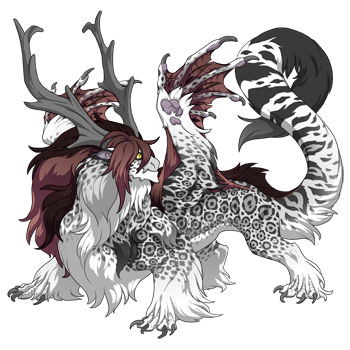
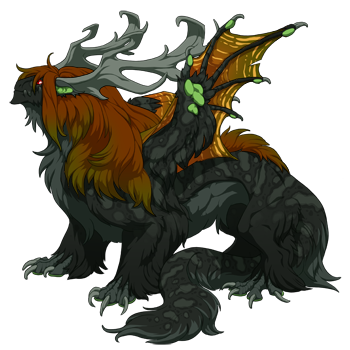
Seekers: Part 1
Two Gaoler Seekers stationed in the Wasteland begin their day. (Written as in-canon human/“beastly” forms.)
As Lumina comes to, she can feel the lips meeting her cheek softening into a smile. She keeps her eyes shut as she holds back a smile of her own, but the calloused hand moving the hair out of her face isn't helping the facade.
"Luminita... Luminiiita..."
The hand is nearing her jaw, and those lips are nearing her ear. She can't believe that she feels almost herself blushing at something that small. It's been years by now, after all.
"It's morning, Luminita..."
The Gaoler rolls over to face her partner, smile in full form. Marzanna has their own sort of sleepy charm at the moment, but they don't look nearly as tired as Lumina imagines she does, late as it must actually be. The shifting of the clouds makes the sun beat against the outside of their tent like rain, and those moments of translucence that the brilliant, late-morning sunlight grants the fabric is more than enough to make Lumina grateful for the night's long-gone cover. And, more than enough to embarrass her when Marz pulls their bodies together, still smiling into their kisses. The Scarred Wasteland possesses none of the supervisors or higher-ranking uppities that once so loved to separate training Seekers- but there's an impulsive fear present that makes Lumina quietly laugh and wrap a leg around Marz anyways. Pity she's such a terrible listener, so rebellious, so feeling, they'd say, because she's awfully skilled at what she does.
But, for a few moments, Lumina can't think about much of anything as Marz works on her neck. They're not quite smiling anymore, but she can't imagine it'd be easy to keep up. Still smiling herself, though, she brushes her fingers through her partner's messy, morning hair as the words discreetly escape her mouth. "How long have you been awake, hm?"
"Since sunrise," they mutter with that smile, still playful, as they break their affection. Nestling their chin on Lumina's chest, their arms weave their way around the larger Gaoler's hips. Adoring red eyes gaze into their lover's gentle yellow, and Marz knows, if they were draconic at that very moment, there'd be little to stop themself from purring. Not as long as those fingers grace their hair.
"Sunrise?" Lumina weakly whispers, almost with genuine surprise. "You let me sleep so long, love. I thought you'd just overslept too." She laughs again, louder and freely, and can't see Marz's pure ecstasy at the expression. It's a true shame, though, because she'd have loved to. Regardless, her voice still carries ambrosial remnants of that laughter as she continues on. "Oh, well, you do always scold me for doing the same." Her thumb brushes against Marz's cheek, and she has to restrain another laugh as she can just about feel Marz melting into that touch. "So I'd say we're even now."
They stay like that for far longer than either would like to admit. But they've no targets here, no clues. They have time. To sleep in, to stay put, to admire how that wavering sunlight frames the other's features so impeccably, tempting their lips and tempting their hands. It's Lumina who breaks the stasis, though, speaking up again. "Have you checked the traps?"
Marz pauses, as if recalling the greater world. "I- no, not yet. I know you like the walk there. And, even if we've lost breakfast that way, we still have food in store."
"I think we should go check, then. We'll gather what we can, have our late breakfast- and then get to work. I doubt we'll move camp today, but we could always start packing up." She shifts a little, debating whether to so swiftly push her partner away. "Wouldn't hurt."
Marz answers with action, quietly unfurling their arms and propping themself up. Lumina has to stretch a little more, but finds herself in the same position soon. They don't talk as they put on their armor or slip on their boots, and, just as well, leave the tent with that same silence. The clouds are more sparse now, and the wind which fueled them is hot and suffocating once one is the midst of it. Lumina simply pulls the collar of her jacket in front of her nose and mouth, a few muffled coughs escaping, as Marz tolerates it. But, once they properly adjust the hatchet at their hip, they silently reach out a calloused hand to their lover.
Just as well, Lumina takes it with the same silence.
#fr#flight rising#gaoler#fr lore#fr gaoler#fr writing#gaoler fr#they're lesbians!! marz is nb and lumina's a laaaaaaady. just to make it clear.#drakefr#drakeart#lumina#marzanna#745 words... how much is that. short? long?#also yes. expect more.#no one's asked yet but expect more#story: seekers
12 notes
·
View notes
Note
for the ch development ask: 5 and 7 for rhys and 19 and 31 for marzanna
CHARACTER DEVELOPMENT MEME - send me more
wip: WINDWARD - character: RHYS NEVAEH
5. On an average day, what can be found in your character’s pockets?
beyond the bone whip looped at his hip, rhys carries a small sheathed blade in his pocket. you’ll also find a couple of gold coins, a compass and a telescope, some ratty old torn piece of a map and an old pocket watch he never opens but pulls out to play with when he’s thinking and you can see the edge of a photo peeking out of the clasp but no one will ever see what’s inside
7. Does your character have recurring themes in their nightmares?
his fear of being boarded by any other ship carries over into his dreams. any ship - other pirates, royal navies, pleasure vessels (which are the new thing). when he’s really stressed about something, he’ll have nightmares about a terrifying storm sinking his ship - swells many times taller than the main-mast, lightning flashing, illuminating the sails and the shadows of something terrifying in the water, a deep groaning, the call of an angry god set on destruction or the creaking of the ship as it gives way to the call of the ocean
wip: WINDWARD - character: MARZANNA GOREE
19. What is your character’s biggest relationship flaw? Has this flaw destroyed relationships for them before?
her biggest relationship flaws are both her fear of intimacy and her inability to fully trust a partner enough to have something to hold onto. marzanna has been keeping people at a distance since she left her father’s village to go to a port city in laerra. she is not a people person; she has too many secrets that would get her killed to open up to anyone. so any relationship she has had, romantic or platonic, have been fleeting at best.
and now that she’s been taken from her homeland forcefully by a foreign king who would have certainly killed her if she even gave him the chance and is on the run aboard rhys’ ship, relationships are both inevitable and terrifying. she’s going to have to learn to trust this crew because she is already trusting them with her life.
31. Describe a scenario in which your character feels most comfortable.
feet buried in the sands of her homeland, sun bearing down on her, dark hair sticking to her skin, salt and sand on her tongue, the roar of the ocean in her ears, eyes closed, face turned up to the sky. she is peaceful, she is powerful. the few people who know her, all of her, wait just over the crest of the sand, the pull of the ocean, fire in her veins.
the closest she can get aboard the ship in the ocean, is the small painting she keeps tucked in her trunk. a painting of her home painted by her little sister. she looks at the sky and knows her sister is looking at the same sun and she knows that one day, they’ll be together again.
2 notes
·
View notes
Note
"Hm." Graham held the paper tight in his calloused fingers. Dammit. This scrap of map scribbled by Edith didn't mean a thing to him. He turned it over, trying to match the street, but the rough lines didn't match in the slightest. Was this even the right neighborhood. " 'Scuse me." He called to a woman nearby and squinted back at his paper. "Where is... where the hell is main street?"
@midnightwalkin
It wasn’t rare for strangers to approach her for directions; Marzanna knew she looked approachable, though it surprised her each time it happened. Her eyes widened for a moment, then she quietly shuffled close to Graham. The paper in his hands was noticeable enough for her to assume he was trying to use that as a reference. “Hmmm…” Marzanna narrowed her eyes and thoughtfully hummed. This was definitely a familiar place, even if the scribble was very… it didn’t have a lot of detail, that was obvious. “I think I know where this is,” she said, then paused to gather her thoughts. So far she had been in this town for a little less than three weeks, but she had still a long way to go in terms of familiarity with its structure and alleys.
“I believe it’s that way,” one hand pointed towards the direction she could remember, while her gaze was stuck on the slip of paper. “Then, you turn to the right, and you should be on the main street.” it sounded correct, but not quite. Marzanna stepped back, and offered Graham a smile. “While I wouldn’t say it’s wrong, I think you should ask someone else as well,” a light giggle gave a bump to her words’ rhythm, “I’m basically a newcomer, so I barely know where the important areas are.” she surely looked out of place amongst these people. Her attire and the way she carried herself was nothing like the atmosphere lingering in the air; she did not mix in, not in the slightest. Her amicable personality, though, made up for that.
Head tilted to the side, and wavy locks bounced accordingly. “I hope it was of help, sir.”
#midnightwalkin#i used marza because !! why not!!#OH I'M SO HAPPY TO SEE YOU PLAYING GRAHAM AGAIN#i love him like all of your characters eeeeee#sealed with wax || asks.#marzanna || thread.
1 note
·
View note
Note
Yuu: no it's better if mom explains because I'm not ready too open the can of worms
Amy: ew
Yuu: Hypothetical!
Amy: oh OvO
Evelynn: typical Amy... 🙄
---Marzanna comes back with Rest of the older Irving's and the eldest on carried on her back knocked the f out and the 3 other bot scared while the wife of the 2nd eldest is confused---
Marzanna: I am back and WTH is hoping on?! D:
@askyuuandco
Yuu: Hey I'm here to give out PTC posters...heeeelllloooo =o=
Rosia: Ah, hello Yuu. Are you advertising the PTC? <:)
11K notes
·
View notes
Note
Is the summer solstice significant to Marzanna/Morana? I've also heard it called Kupala Night, but maybe that's something different?
summer solstice is Kupala’s Night, my forever favourite celebration of joy, and love, and mystery, and life! a significant and magical night, so short and yet so full of experiences and eeriness.
I have read some sources stating that the drowning/burning of Morana was carried out during Kupala’s in some places and practices, but it is rather generally agreed upon that this celebration should happen during Jare.
for Morana I’d say it is the spring equinox that’s more significant, it being the final moment of her reign and beginning of spring and the rule of the Sun and Life.
12 notes
·
View notes
Photo

Slavic gods described by Stanisław Jakubowski, part 12/20:
Marzanna / Morana / Morena
Marzanna is the goddess of the night, winter, death and pestilence. The old Slavs in Poland began their new year in March when the winter was escaping under the rays of the Sun and when the warm spring was coming. In a ritual of the turn of the seasons, a straw effigy of Marzanna is made in each village, clothed, and carried out to a river where she is put on fire and thrown to the river in a symbolic 'drowning' ceremony. If there's no river flowing nearby, deep enough to let the effigy swim down with the flow, she is then burnt on a pile. The ritual shows elements of pre-Christian funerary customs - a symbolic annual death of Marzanna as goddess of winter. The ritual is performed with ceremonial songs including chants like: "We are carrying the death out of our village, bringing summer into it". After that ritual a pine-branch decorated with colorful ribbons is brought to the village - that part of the ritual was called 'new summer' or 'grove holiday'.
Source of image: Stanisław Jakubowski 'Bogowie Słowian' ['Gods of the Slavs'], 1933. The text includes informations based on the same source.
#slavic gods by jakubowski#stanisław jakubowski#slavs#slavic mythology#polish mythology#slavic paganism
160 notes
·
View notes